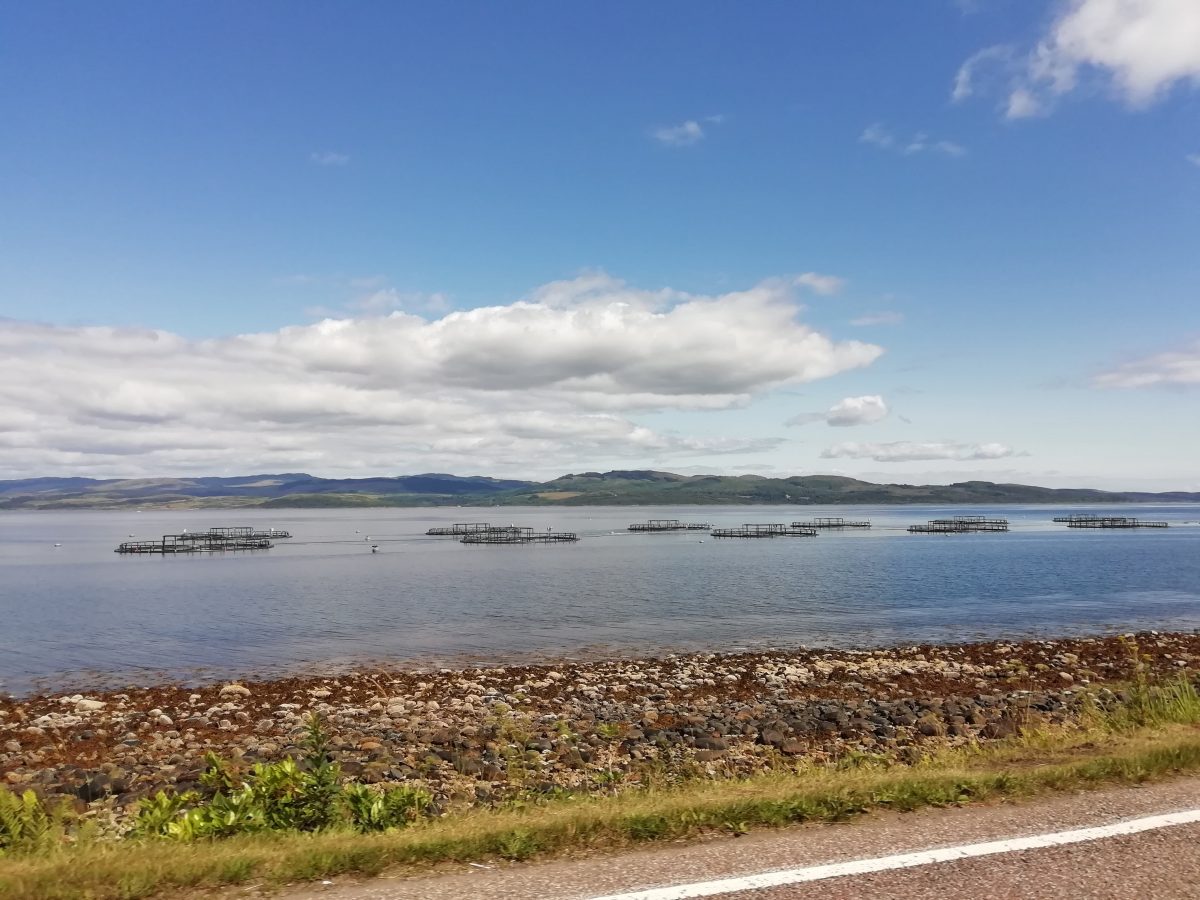
Fish farm, Loch Fyne ©Fidra
Following the recent review of aquaculture regulation, what’s next for Scottish salmon farming?
After the two 2018 parliamentary inquiries into salmon farming and several consultations on salmon farm management and regulation, it was unclear what additional insight a further review would provide, however the insights of the recent review are proving a talking point for policy makers. The recommendations of the report produced by Professor Griggs have been accepted by the Scottish Government in principle, and it remains to be seen how effectively they will be implemented.
With the government’s Vision for Aquaculture in Scotland in development, Fidra’s Best Fishes project believes this is an opportunity to set the tone for a policy framework that puts the health of the natural environment at its core. The Scottish Government’s statement in its current Programme for Government that it ‘will take forward an immediate programme of work to better protect wildlife and the environment’ needs to be more than just words[1].
The review’s brief
Professor Griggs was asked by Mairi Gougeon MSP Cabinet Secretary for Rural Affairs and Islands to:
- review the existing evidence base and engage with key stakeholders in order to identify the issues impacting on the efficient and effective operation of the regulatory framework for aquaculture from the perspective of the industry, users of the shared marine environment (tourism, wild fisheries), communities and regulators; and
- make recommendations for further work in relation to improved efficiency and more fundamental institutional reform.
The review team accepted written submissions and conducted interviews until December 2021[2]. The report highlights that all the people and organisations that provided input to the process thought that the current regulatory system for aquaculture needs to change. Fidra would agree current regulations need to change, with urgent action taken to protect the environment.
Professor Griggs’ recommendations
It is vital that considering and implementing the recommendations from this latest review does not slow down or supersede those from the previous inquiries that are being actioned, developed or planned. In particular, the earlier inquiries clearly stated that salmon farming should not be allowed to grow or expand if the environmental impacts of the industry were not addressed.
As Dr Clare Cavers, Senior Projects Manager at Fidra, points out: “This review should be another step in addressing concerns around the environmental impacts of salmon farming and not a way to skirt round them”.
A summary of the Griggs’ recommendations are:
- Finfish, shellfish and seaweed should have different regulatory frameworks designed specifically for each sector;
- There should be a single website and body with guidance on aquaculture;
- There should be a new single consenting document which mandates what all parties including the local community are subject to, and which contains a ‘social contract’ that recognises the community and its needs;
- Science and other evidence used by all in the sector is reviewed independently, with a central science and evidence base run by industry and Scottish Government, and part of the licence cost used to fund further scientific and other research;
- The Scottish Government produce a 10 year framework for each sector within 12 months, working with all parties through a Project Board;
- All existing sites should be examined to determine whether they can operate within the framework once it is in place, and sites where finfish production is unlikely to continue under the new framework should give up all licences held on that site;
- A single licencing payment is introduced based on production volume of each site, that covers the costs of all parties involved in the process, including a new licencing and consents unit, and also addresses community benefit by ensuring a significant amount goes back to the communities of the areas where sites are situated;
- Innovation and development is encouraged with special consents or licences.
Interpretation and implementation
There is, as ever with discussions around industry, a focus on the economic contribution of aquaculture in Scotland. By definition an economically sustainable practice must not negatively impact the social, environmental and cultural aspects of a community. Interpreting and implementing the recommendations of the review must therefore take consideration of the environmental impacts and cost of the industry[3], and work to minimise them.
The recommendation to examine sites to ensure they can operate within the new framework is a step towards this. Fidra believes that removing the licences of farms that cannot operate within the new framework must be prioritised over enabling the establishment of new sites. It is important to identify existing sites which are in the wrong place or the wrong size, so that their impacts on the environment are stopped as quickly as possible
While a more co-ordinated approach towards licensing, monitoring and regulation is welcomed by Fidra, it must not come at the expense of local authorities and communities having a strong voice in these processes. Rather than being involved less they should be more empowered to make informed decisions and have access to accurate and comprehensive information, and sound scientific advice.
The report appears to favour the use of adaptive management over the precautionary principle, without suggesting that the two may not be totally exclusive. Fidra believes a regulatory system can be adaptive and also encompass precautionary approaches. Certainly any implementation of Professor Griggs’ recommendations should take into consideration the outcomes of the previous inquiries and the Salmon Interactions Working Group, which include recommending use of the precautionary principle.
While there is a lack of emphasis on environmental impacts, the desire to see changes happen as fast as possible with input from all interested parties including local communities is a positive step, and hopefully a further consultation process will provide the opportunity to highlight ongoing concerns.
See our webpage on salmon farming environmental impacts[3] and sign up to the Fidra newsletter to keep updated.
[1] https://www.gov.scot/publications/scottish-government-and-scottish-green-party-shared-policy-programme/pages/our-natural-environment/
[2] https://www.gov.scot/publications/review-aquaculture-regulatory-process-scotland/pages/10/#A
[3] https://www.bestfishes.org.uk/scottish-salmon-farming-impacts/

